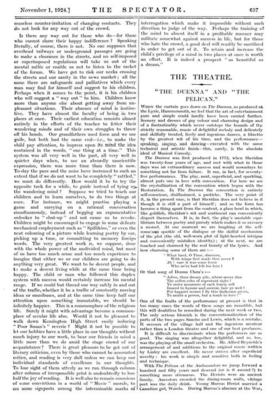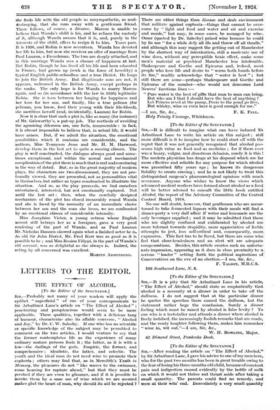THE THEATRE.
"THE DUENNA" AND " THE PELICAN."
WHEN the curtain goes down on The Duenna, as produced at the Lyric, Hammersmith, we feel that the art of entertainment
pure and simple could hardly have been carried further. Scenery and dresses of gay colour and charming design and of a fantasticality which never outsteps the bounds of the
strictly reasonable, music of delightful melody and delicately and skilfully treated, lively and ingenious dances, a libretto by the greatest wit of his time, and the performance— speaking, singing, and dancing—executed with the same
technical and artistic finish—this, surely, is the absolute ideal of Musical Comedy.
The Duenna was first produced in 1775, when Sheridan
was twenty-four years of age, and met with what in those days was an extraordinary success and would nowadays be something not far from failure. It ran, in fact, for seventy- five performances. The play, neat, superficial, and sparkling, almost puts one in love with convention. For here we see the crystallization of the convention which began with the
Restoration. In The Duenna the convention is entirely self-conscious, disillusioned, a pastiche. The very point of it, in the present case, is that Sheridan does not believe in it though it is still a part of himself ; and so the form has become a thing apart from the content, a glass bowl in which, like goldfish, Sheridan's wit and sentiment can conveniently disport themselves. It is, in fact, the play's unstable equi- librium between poetry and parody which makes it so savoury a morsel. At one moment we are laughing at the self- conscious sparkle of the dialogue or the skilful mechanism
of the plot (the old, well-worn plot of light-hearted intrigue and conveniently mistaken identity) ; at the next, we are touched and charmed by the real beauty of the lyrics. And how charming some of them are :-
" What bard, 0 Time, discover,
With wings first made thee move ?
Ah ! sure it was some lover Who ne'er had left his love I
Or that song of Donna Clara's :- " Adieu, thou dreary pile, where never dies The sullen echo of repentant sighs I Ye sister mourners of each lonely cell Inured to hymns and sorrow, fare ye well For happier scenes I fly this darksome grove, To saints a prison, but a tomb to love !"
One of the faults of the performance at present is that in too many cases the words of these songs are inaudible, but
this will doubtless be remedied during the next week or two. The only serious blemish is the conventionalization of the parts of the two pages Sancho and Lewis, which is a mistake. It savours of the village hall and the ingenious amateur rather than a London theatre and one of our best producers. It is difficult to discriminate when the performers are so good. The singing was altogether delightful, and so, too, was the playing of the small orchestra. Mr. Alfred Reynolds's arrangement of and additions to the original music written by Linley are excellent. He never strives after superficial novelty : his work is simple and sensitive both in feeling and technique.
With The Pelican at the Ambassadors we jump forward a hundred and fifty years and descend (or is it ascend ?) to something more strenuous. The Heriots were an ancient family. Ancestors crowded the dining-room walls, vintage port was the daily drink. Young Marcus Heriot married a
Canadian girl, Wanda. During Marcus's absence at the War, she finds life with the old people so unsympathetic, so soul- destroying, that she runs away with a gentleman friend. There follows, of course, a divorce. Marcus is unable to believe that Wanda's child is his, and he refuses the custody of it, although Wanda swears that it is, and, purely in the interests of the child, offers to resign it to him. Years pass. It is 1936, and Robin is now seventeen. Wanda has devoted her life to him, but now she receives an offer of marriage from Paul Lauzun, a Frenchman. The two are deeply-attached, and in this marriage Wanda sees a chance of happiness at last. But Robin, though he has lived all his life and been educated in France, had grown up (such is the force of heredity) a typical English public-schoolboy and a true Heriot. He longs to join the British Army. But illegitimate sons are not, it appears, welcomed in the British Army, except perhaps in the ranks. The only hope is for Wanda to marry Marcus again, and so (in accordance with the law in 1936) legitimize Robin. She is torn between her longing for happiness and her love for her son, and finally, like a true pelican (for pelicans, you know, feed. their young with their life-blood), she sacrifices herself (and, incidentally, Lauzun) for Robin.
Now it is clear that such a plot is, like so many (for instance) of Mr. Galsworthy's, a put-up job. The methods of avoiding the agonizing dilemma are, one feels, innumerable : in fact, it is almost impossible to believe that, in actual life, it would have arisen. But, if we admit the situation, the emotional possibilities which it contains are considerable, and the authors, Miss Tennyson Jesse and Mr. H. M. Harwood, develop them in the last act to quite a moving climax. The play is well constructed, the dialogue always good and some- times exceptional, and within the unreal and mechanical complication of the plot there is much that is real and convineirig in the way of detail. But, as in the great majority of modern plays, the characters are two-dimensional, they are not pro- foundly viewed, they are presented, not as personalities vital in themselves, but rather as types constructed to illustrate the situation. And so, as the play proceeds, we find ourselves entertained, interested, but not emotionally captured. Not until the last act : then, when the carefully designed mechanism of the plot has closed inexorably round Wanda and she is faced by the necessity of an immediate choice between her son and the man she loves, we are confronted by an emotional climax of considerable intensity.
Miss Josephine Victor, a young actress whose English accent still betrays her as a foreigner, gave a very good rendering of the part of Wanda, and as Paul Lauzua Mr. Nicholas Hannen showed again what a finished actor he is. As old Sir John Heriot, Mr. Fred Kerr was as good as it is possible to be ; and Miss Rosina Filippi, in the part of Wanda's old servant, was as delightful as she always is. Indeed, the acting by all concerned was excellent.
MARTIN ARMSTRONG.











































 Previous page
Previous page